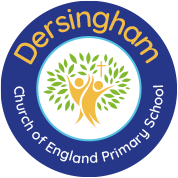Reading at Dersingham
Sharing books: Dersingham Primary & Nursery School staff develop children’s love of reading through enthusiastically reading aloud and telling stories and rhymes. Stories, poems, rhymes and non-fiction are chosen for reading to develop pupils’ vocabulary, language comprehension and love of reading. Daily, each class shares a class book/novel modelling expressive reading. Children are encouraged to discuss their thoughts about the story, identify key vocabulary and develop a love of reading.
Phonics teaching: Read Write Inc: We value the importance of phonics as an underpinning tool to enable children at Dersingham to read and write. The teaching of phonics is an integral part of our curriculum in Reception, Year 1 and Year 2. We use a systematic synthetic phonics approach, following the Read Write Inc. programme. Read Write Inc. is carefully structured in order to teach children the phonic knowledge and skills, predominantly blending and segmenting, that they need in order to decode fluently. Children also learn a variety of ‘red’ words by sight, that cannot be phonetically decoded. We start by teaching phonics to children in Reception where children learn how to say the sounds, blend them together to read words and to segment words for spelling. Children continue to develop these skills in further year groups as they work on more complex sounds and read books at their appropriate reading level. We strive to ensure that phonics sessions are engaging and stimulating for all children. All children on the RWI programme are taught phonics every day and all children are assessed regularly so they work with other children at the same level. This allows all children to participate completely in lessons.
Text based curriculum: Our curriculum is planned around a series of carefully chosen, high quality texts. The texts relate to the year group’s wider curriculum and are used to stimulate writing and immerse children in the curriculum. Each teacher, in liaison with their class identifies, discusses and displays new, challenging and interesting vocabulary with the expectation that it will be used by the children.
Destination Reader: Our school has adopted Destination Reader as a consistent approach to teaching reading in KS2. It involves daily sessions incorporating whole class modelling prior to the children applying these skills through partner work and independent reading. Children deepen their understanding of the texts they read through the systematic use of a series of strategies and language stems. The approach encompasses the key principles of effective reading provision and fully meets the requirements of the National Curriculum. It also builds a culture of reading for pleasure and purpose.
Supporting parents/Home Reading: Dersingham provides information to parents about supporting their child’s learning at home, including detail about the school’s method of teaching reading and how to help their children learn to read. Discovery cafes, parent workshops and guidance from class teachers are all methods that are used to ensure that both phonics and reading are developed in partnership with parents. The school has high expectations of parental support including a clear amount of reading time that parents should be completing each week.

